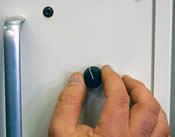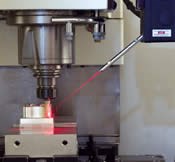Auto Nozzle Makes Minimum Quantity Lubrication Hands-Free
Minimum quantity lubrication, or MQL—also called near-dry machining—applies cutting fluid in ounces instead of gallons.
Minimum quantity lubrication, or MQL—also called near-dry machining—applies cutting fluid in ounces instead of gallons. It replaces flood coolant with atomized droplets of oil, usually vegetable-based. While flood coolant can hit the tool within an inch, the stream of MQL droplets has to hit the cutting edge within less than a millimeter.
Chris Haugen, a sales manager for lubricant and MQL equipment supplier ITW ROCOL, says this requirement of MQL explains why his company recently partnered with SpiderCool, which offers a programmable nozzle system.
Near-Dry Advantages
MQL offers advantages over both flood coolant and dry machining. These can include both greater tool life and better chip clearance, with both benefits resulting from the high lubricity of the MQL oil. However, if the light lubricant stream misses the tool because the nozzle is misaimed, then near-dry machining can turn into just plain dry machining. Applying MQL in many shops therefore requires a machine operator to repeatedly check and adjust nozzle position.
ITW ROCOL’s Accu-Lube product line includes a compact system for adding MQL to an existing machining center, and historically the system has suffered from this nozzle-aim limitation. Now, the system is available with the SpiderCool nozzle as part of a single installation.
SpiderCool uses servo control for nozzle positioning. The operator adjusts the nozzle using a tuning knob, with a beam of light showing where the nozzle aims. Once the proper targeting is found for a tool, the system remembers the tool’s pocket number so it can return the nozzle to that position each time the tool is loaded. With this system, Haugen says nozzle aim no longer has to be watched or adjusted during the cycle to make sure the lubricant keeps hitting accurately. In fact, thanks to the servo control, the system can even be used to give the nozzle a slight oscillation—flicking the lubricated chips out of the way of the cut.
Why use MQL? Tool savings and reduced fluid costs are among the benefits mold shops achieve. However, another benefit seems to be even more important—the typical shop prefers to run clean.
This cleanliness is the main motive for MQL, he says. Lighter use of cutting fluid results in both a cleaner machine and a cleaner shop—even a better-smelling shop. The value of this cleanliness in terms of both customer impression and employee morale may be difficult to quantify, but it seems to be the most significant return on investment that shops are looking for when they switch to near-dry machining.
Related Content
-
Revisiting Some Hot Runner Fundamentals
What exactly does a hot runner do? If you’ve been in the injection molding industry for any length of time, you might think the answer is obvious, but it is not.
-
The Ins and Outs of Hot Runner Temperature Control
A training checklist that explains the why and how of proper hot runner temperature control and system management.
-
Fundamentals of Designing the Optimal Cooling System
The right mold components can help improve mold cooling and thereby produce higher-quality parts.
















.png;maxWidth=300;quality=90)

